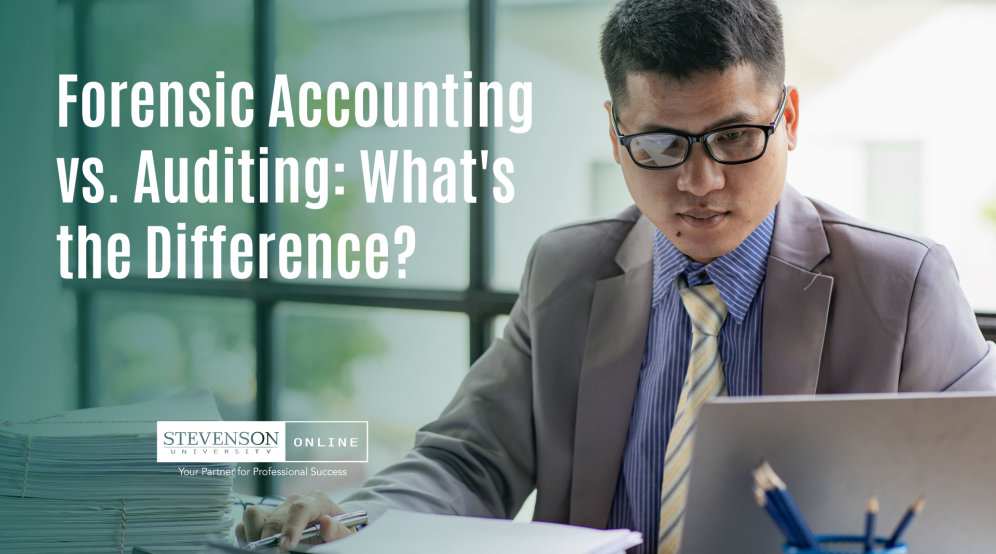Forensic accounting and auditing are two closely related fields that play critical roles in helping organizations and individuals manage risk, detect fraud, and maintain compliance with laws and regulations.
Both fields share some similarities, but they are distinct in terms of job duties, qualifications, and reporting requirements. Understanding the difference between forensic accounting and auditing is essential for anyone considering obtaining a master’s degree in an accounting-related field, as it can help you make an informed decision about which path is best suited to your interests and goals.
What is Forensic Accounting?
Forensic accounting is a specialized field of accounting that involves investigating financial records and transactions to identify potential fraud, misconduct, or other irregularities. Forensic accountants often work with legal professionals to prepare evidence for use in legal proceedings such as civil or criminal trials, arbitration, or mediation.
What Does a Forensic Accountant Do?
Forensic accountants may perform a variety of tasks, depending on the nature of their engagement. Some common duties include:
- Conducting financial investigations to identify fraud, embezzlement, or other financial crimes
- Preparing and analyzing financial statements, tax returns, and other financial documents
- Calculating damages and losses in legal disputes, insurance claims, or other contexts
- Providing expert witness testimony in legal proceedings
- Collaborating with law enforcement agencies, attorneys, and other professionals to investigate financial crimes and prepare cases for trial
What is Forensic Auditing?
Forensic auditing is a specialized form of auditing that focuses on investigating potential financial irregularities or fraud. Forensic auditors may be called upon to investigate specific transactions or to conduct comprehensive audits of an organization’s financial records to identify areas of risk or potential fraud.
What is a Forensic Audit?
A forensic audit is an in-depth examination of an organization’s financial records and transactions to identify potential fraud, misconduct, or other irregularities. The purpose of a forensic audit is to gather evidence that can be used to support legal action or to help the organization take corrective action to prevent future fraud. Forensic audits are typically conducted in response to specific allegations of wrongdoing, such as embezzlement, financial statement fraud, or kickbacks.
The Difference Between Forensic Accounting and Auditing
While forensic accounting and auditing share some similarities, there are several key differences between the two fields. These differences include job duties, qualifications, and reporting requirements.
Forensic accounting tends to focus on investigating specific transactions or issues, such as fraud, embezzlement, or misappropriation of funds. Forensic accountants often work closely with legal professionals and law enforcement agencies to prepare evidence for use in legal proceedings. In contrast, forensic auditing is typically a broader examination of an organization’s financial records to identify areas of risk or potential fraud. Forensic auditors may conduct comprehensive audits or investigate specific issues, depending on the nature of the engagement.
Qualifications for forensic accounting and auditing professionals also differ. Forensic accountants typically have a degree in accounting or finance, along with specialized training in forensic accounting. They may also hold certifications such as Certified Fraud Examiner (CFE) or Certified in Financial Forensics (CFF). Forensic auditors may have a degree in accounting, finance, or a related field and may hold certifications such as the Certified Internal Auditor (CIA) or the Certified Fraud Examiner (CFE).
Reporting requirements for forensic accounting and auditing professionals also differ. Forensic accountants are often called upon to prepare reports and provide expert witness testimony in legal proceedings. Forensic auditors may be called upon to provide reports to management or to regulatory agencies, but their work is typically less focused on legal proceedings.
Choosing Your Career Path in Accounting
Understanding the differences between forensic accounting and auditing is crucial for anyone considering a career in accounting or related fields. While both fields share some similarities, they also have distinct differences that can impact the type of work you do, the qualifications you need, and the career opportunities available to you.
As the field of forensic accounting continues to grow and evolve, pursuing a specialized degree, such as a master’s in forensic accounting, can be a smart investment in your future career prospects. By gaining a clear understanding of these differences, you can make an informed decision about which path is best suited to your interests and goals.
Obtain a Master’s Degree to Qualify for New Career Opportunities
Obtaining a master’s degree in accounting or a related field, such as the Master’s in Forensic Accounting program at ������ýֱ�� Online, can be a great way to qualify for new career opportunities and advance in your career.
Our program provides students with advanced training in accounting principles, specialized knowledge in forensic accounting, and the opportunity to network with other professionals in the field. Contact our enrollment counselors today to learn more about our Master’s in Forensic Accounting program.







